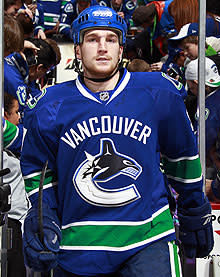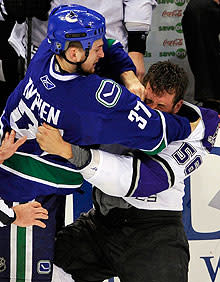Family, friends struggle with Rypien’s death
TORONTO — The day the NHL suspended Rick Rypien(notes) last October, Vancouver Canucks general manager Mike Gillis held a between-periods session with reporters in Chicago. Rypien, a tough guy, had grabbed a Minnesota Wild fan on his way off the ice after a fight. Something Gillis said stuck out to me then and sticks with me now.
“He hasn’t let anybody down,” Gillis said.
He hadn’t? Rypien made a black-and-white mistake – you never, ever put your hands on a fan – and because of it he and Gillis had to appear before commissioner Gary Bettman, deputy commissioner Bill Daly and Colin Campbell, the league’s disciplinarian at the time. He had to sit out six games.
But this didn’t seem like knee-jerk support for a player. There was compassion in Gillis’ voice. It was clear there was more to the story.
Not long afterward, Rypien took a leave of absence from the Canucks, the second of his career. On Monday, just when he seemed ready for a fresh start with the Winnipeg Jets, Rypien was found dead at his offseason home in Coleman, Alberta. He was 27.
Jets assistant GM Craig Heisinger told reporters in Winnipeg on Tuesday that Rypien had battled depression for a decade. Police said Rypien’s death was not suspicious. No official cause of death has yet been given, but a Vancouver radio station reported he committed suicide.
Many of us know people who have battled depression. Some of us have known people who have committed suicide. I had a friend who took her own life. Of all the funerals I have attended for young people who have departed too soon – and there have been far too many – hers was the most haunting. She didn’t die in an accident. She didn’t die of cancer or a heart problem or an easy-to-accept physical ailment. She left everyone wondering what they had missed, how they could have stopped it.
I’m sure Rypien’s family and friends are going through that now, along with the hockey world at large.
“I guess you have to look at every situation and take what you can and try to learn from it,” said Mathieu Schneider(notes), a special assistant to the executive director of the NHL Players’ Association, who played with Rypien briefly in Vancouver in 2009-10. “I certainly would like to know if there’s anything more that could be done, could have been done or can be done in the future.”
The NHL and the union do have a program in place to help players deal with personal problems, and Rypien received a lot of patience, support and treatment. We have to do all we can, but sometimes, sadly, that’s all we can do.
“People have said to me, ‘Well, what’s he got to be depressed about? He’s making a lot of money. He’s young. He’s single. He’s got everything that a kid dreams of,’ ” Schneider said. “But I think it just demonstrates that pro athletes are normal people and they go through the same issues that a stock broker or a banker or an electrician [does]. We have everyday issues like everyone else, and you deal with them the same way normal people deal with them.”
Rypien, a boxer’s son, is being remembered as a fighter, one of the best pound-for-pound pugilists in hockey, someone who scrapped for everything he got. He was never drafted into the Western Hockey League but captained the Regina Pats. He was never drafted into the NHL but played parts of six seasons with the Canucks. At 5-foot-11, 190 pounds, he punched well above his weight class, but he also showed enough skill that Schneider thought he could be more than a fourth-line enforcer.
Adversity was an issue. Rypien scored in his first NHL game but suffered a broken fibula in his fifth, and he went through a string of injuries afterward – thumb, groin, finger, hernia. That pain, people could see. The depression, they could not.
Rypien took his first leave of absence during the 2008-09 season. The reason was kept private. His own teammates generally didn’t know the details – and didn’t pry to find out. He seemed fine when he returned. He worked hard. He hung out. He was one of the guys.
When a friend or family member has personal problems, sometimes you don’t want to make the problems worse by bringing them up when all you want to do is help. Athletes often talk about teams as families, but locker rooms have the added dimensions of machismo and code. Solving those dilemmas is easier said than done.
“It always seems when things like that happen, it becomes taboo,” Schneider said. “You don’t talk about it in the dressing room. Players don’t want to talk about it. They don’t want to discuss it. And essentially your teammates are your closest friends, the guys you spend the most time with. You know, maybe it needs to be talked about more in an environment where players are comfortable with it and you can discuss it in the dressing room.
“But you know, I think as a player, you always want to keep your private life private and not bring it in the dressing room. There’s certainly a sense of that. I’m not sure what can be done different, but hopefully we’ll be able to figure out some things that can help a player like Rick in the future.”
If a player is going through a personal problem today – depression, drugs, alcohol, whatever – he can turn to teammates, team officials or team medical personnel. If he is uncomfortable doing that, maybe because he might appear weak or soft, he can call a help line. The league and union have an assistance program to handle evaluation and treatment. League and union doctors can refer a player to the appropriate expert for his condition.
“Obviously if a player doesn’t share anything with anybody, and nobody knows what he’s going through, you’re not going to catch that player,” Daly said. “But that wasn’t Rick’s situation. I don’t get to know everything, because there’s a lot of confidentiality associated with the program, but I can tell you, from what I do know, I’m very comfortable with how the program handled Rick’s situation.”
Gillis declined to give specifics about Rypien’s treatment when he met with reporters Tuesday in Toronto, but Canucks management knew Rypien’s problems in detail. Those problems were the background for the fan incident last October and were considered when Bettman gave him six games – a stiff suspension, but not as harsh as possible.
“I don’t think you can segregate that out and say it was an isolated incident or something separate and apart from what he was going through,” Daly said. “I think it was very much related to what he was going through. I think the commissioner … I would say more generally, there are a lot of circumstances that come into play to every decision that is made by the commissioner on discipline, and so I would imagine in that situation in particular he took all the circumstances into account.”
The Canucks gave Rypien those two leaves of absence. Gillis said they relied on experts, league and union doctors and different facilities. They were happy for Rypien when he signed with the Jets as a free agent, turning down larger offers elsewhere. He seemed comfortable in Winnipeg, where he had played for the AHL’s Manitoba Moose. He seemed happy. He seemed ready to come back to the NHL.
It’s heartbreaking.
“Our organization as a whole was intimately involved in what Rick was going through,” said Canucks assistant GM Laurence Gilman. “He received a tremendous amount of support. His life was touched by a lot of people in the Canucks organization – our training staff, our coaches, our PR staff, our management. I think a lot of people were involved in a caring manner, and I think it’s something that a lot of people are really suffering through in our organization because we cared so much about him."
I don’t know what more could have been done. I don’t know if there is a lesson here. But I know this: If you're depressed, you're not alone.
“I think anybody – whether they’re players or not – there are always people out there who care,” Gilman said. “Rick had a tremendous amount of support. Whether you’re in the hockey industry or any other industry or any other walk of life, there are people out there who want to help and support you. … There’s always support for you, and go seek it.”
Other popular stories on Yahoo! Sports:
• Tiger, LeBron among worst celebrity tippers in America
• Does Miami deserve the 'death penalty?'
• NBA legend Scottie Pippen wins big settlement


